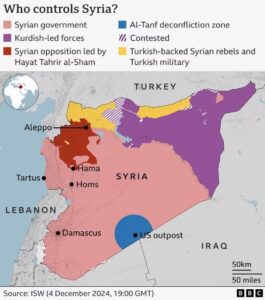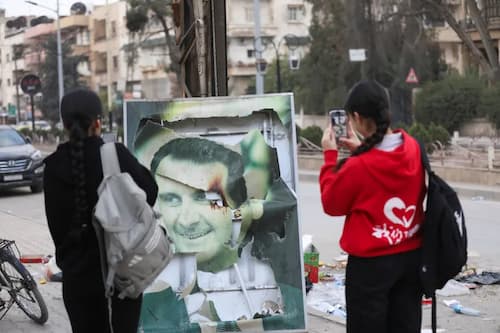It’s almost been mystifying.
The speed and ease with which rebel forces have taken major Syrian cities and, as of Saturday, reached Damascus itself, has been astounding.
The total collapse of the Syrian Arab Army is also shocking.
And there’s the glaring lack of intervention by Russia or Iran to help protect the Syrian state – regardless of their respective distractions of Ukraine and Israel.
It’s almost as if it was somehow mutually decided by all parties that Damascus would fall and the regime would be overthrown.
In barely a week, the Syrian state was able to be toppled by marauding opposition fighters.
Footage on Sunday showed rebel fighters and celebrating civilians parading through Assad’s palace, apparently marvelling at his hundreds of luxury cars: reminiscent perhaps of Libyan rebels looting Gaddafi’s compound over a decade ago, though there weren’t the expensive cars then.
The shockingly lightning speed of the collapse is highly reminiscent of the Taliban’s rapid takeover of Afghanistan, with the then Afghan government forces putting up virtually no resistance and NATO embarrassingly abandoning the country to its fate.
But of course we know that the Americans had already made a deal with the Taliban a year before this – specifically President Trump had made arrangements with the Taliban leaders, which is what had precipitated the Taliban takeover and helped create the abject demoralisation of Afghan government forces.
So, why does this Syrian situation seem to resemble that state of affairs so much? Did some undisclosed deal get made, off the record?
Between who? Putin and Erdogan? Moscow and Washington? Tehran and the Kremlin?
Certainly not between Assad and Erdogan, by all accounts.
Granted, the Syrian government only survived last time because the Russians intervened: but, even so, did anyone think the Syrian state and its army was this weak?
Some outlets are citing poor wages for the army and a diminishing incentive.
But is that really a motive for complete surrender, rendering years of fighting and immense cost meaningless?
Something smells very off about how rapidly this has unfolded.
Barely a day after the fall of Damascus and the news of Bashar Assad’s escape from the country, the Russians were already withdrawing completely from the area, abandoning its previously all-important Tartus base and withdrawing all assets. They’re now apparently seeking Turkish assistance in withdrawing from Syria safely.
It seems as if Assad’s departure and Russia’s withdrawal were pre-planned. A seemingly embarrassed Putin has barely mentioned the word Syria.
Sure, it’s likely that Russia’s quagmire in Ukraine, and the Israeli attacks on both Hezbollah in Lebanon and on the various military sites in both Iran and Syria a month ago, rendered both Russia and Iran unable to act effectively.
But, even so, the total capitulation by all parties on all fronts seems extraordinary.
But we are where we are: whatever the reasons might be. And so we naturally become retrospective.
And it’s looking like, after years of brutal war, millions of deaths, millions of people displaced, destroyed cities, etc, the Syrian state has basically done what it could’ve done right after the Arab Spring – which is stepping aside, making way.
If that’s how this is playing out now, then you have to wonder how much better everything would’ve been had the regime simply come to terms with the original protesters way back in 2011 – before the Islamist groups and armed militias got involved.
Assad could’ve made rapprochement with the protesters early on, made some concessions: instead of allowing the state forces to carry out violent crackdowns on civilians, carry out mass imprisonments, and provoke even worse uprising.

Because it looks like the regime has collapsed now anyway – but with all those years of death and destruction and suffering having been inflicted on the country and its people essentially now for nothing, and with the reality now of apparently hard-line Islamists seizing power: instead of the civilian protesters and political opposition that Assad and co were originally contending with.
The whole thing is beyond depressing.
And Bashar al-Assad might be recorded in history as having been a terrible leader and ultimately a failure who got everything wrong: but an argument might also be had about to what extent he was being held in place by the apparatus of the regime, regardless of his own personal judgements.
That’s not to excuse Assad for his failures. But even if he had stepped aside in 2011, it’s hard to imagine the regime apparatus wouldn’t have tried to hold on to power anyway.
So, what now?
Note that nothing good came from the toppling of the Iraqi state. Plenty of bad things came from it – the list is endless. Nothing good.
Nothing good came from the collapse of Gaddafi’s Libyan state. Only terrible things.
I’m not sure who’s expecting something good to come from the fall of the Syrian state.
Unless perhaps key state institutions and infrastructure can be kept in place and some form of continuity maintained. But surely continuity is not the desire of the anti-government factions – as the entire regime was seen as the oppressor, not simply the singular person of Bashar Assad.
Footage of people celebrating in the streets is understandable. They’re happy about the fall of a decades-long dictatorship that has horribly suppressed political opposition and civilian protest.
People who’ve spent decades under dictatorship centered around one family are obviously going to welcome and celebrate change. And new possibilities.
But where’s the model for success?
Even Egypt, the initial ‘success story’ of the Arab Spring, was a total failure. Less than a year after the Mubarak dictatorship stepped aside, many of the same protesters were back on the street calling for a return to military dictatorship after the brief fling with democracy resulted in the Muslim Brotherhood winning elections.
The result? Egypt is now under a harsher dictatorship than the one the protesters forced out in 2011.
Strangely, the West is fine with the Egyptian dictatorship and its abuses – in a way that it wasn’t apparently ever fine with the Syrian dictatorship.
There’s no real consistency in our moral outrage: it’s almost as if there’s other reasons for why we do business with some harsh regimes and target other similar regimes for destruction.
Imagine that, hey?
So, what now for Syria?
What does this fall – or ‘liberation’ – of Damascus herald?
The ‘liberation’ of Baghdad in 2003 offers no positive precedent. The fall of Tripoli in 2011 certainly doesn’t offer any inspiration either. Both were precursors to years more of conflict, instability and widespread knock-on effects.
Are there years of Libya-like stagnation, violence and dysfunction to come? Further civil wars and endless fighting between rival groups?
Or does it go full religious state? Could it even become a hardline Sunni Islamic state to rival Iran’s hardline Shia fanatics? Won’t that be a fun geopolitical dynamic for the region?
Or will the country get broken up into pieces, perhaps along the lines that already exist now after years of fighting, with Turkey, the Kurds, the various rebel factions, all claiming a piece of the pie?

We discussed that a few days ago, after the fall of Aleppo; the preexisting ideas for sectarian division of territory, largely in line with Israel’s Middle East agenda.
After all, Syria has already become little more than a playground for various powers and interests. It lost its sovereignty and true statehood years ago. Turkey isn’t going to surrender its captured territory. Neither will the Kurds. And Israel has already seized territory.
But who now decides what’s best for Syria?
And who will be looking out for all the Syrian people in their different communities and faiths? And who protects Syria’s cultural and historical heritage?
Given some of what transpired in the early years of the fighting (around 2012, 2013, 2014), with extremist factions acting out sectarian and religious vendettas in particularly ancient towns and villages, there is obvious precedent for concern.
Archbishop Ieronymos in Athens issued a statement December 4th, encapsulating some of the anxiety: ‘The advance of extremist armed groups and the capture of Aleppo threaten the interfaith composition of the region’s population… there is now a looming danger of the complete eradication and disappearance of Greek Orthodoxy and Christianity from the wider region…’
Yes, we’re being told that Hayat Tahrir al-Sham (HTS) has a reformed vision: more inclusive, less violent. Maybe. And they might not be the Islamic State lunatics: but they were still al-Nusra.
Who has the ability or the mandate to hold Syria together as a national entity?
They didn’t answer that question in Libya – and still haven’t answered it to this day.
I never forget an interview I read a few years ago with a Libyan rebel fighter who’d taken part in the overthrow of Gaddafi. Asked by a British reporter about the current state of Libya, the fighter got emotional and said that if he could go back in time he would fight *for* Gaddafi and the old regime to prevent the rebels from winning.
I’m not trying to piss on anyone’s parade. If people are happy about the fall of the Syrian regime, that’s understandable – there’s good reason to be for a lot of people.
A lot of Syrians, that is.
The foreign commentators celebrating the end of the Syrian regime are a different matter – and that’s more to do with Neo-Colonialist smugness and the unrelenting Anglo-American-Zionist geo-political programme.
For them, whitewashing an Al-Qaeda affiliate is nothing new: they already did that in Libya to overthrow Gaddafi. And Al-Qaeda and its affiliates were essentially a Western creation in the first place: which is why NATO had little qualm in acting as Al Qaeda’s air-force during the Libyan catastrophe.
Or as I called them ten years ago: ‘chessboard terrorists that can be moved around the board to wherever they’re needed.’
Maybe these guys will be different. Maybe, now that the fighting is over and the goal of liberation from the regime accomplished, there might be a softening of ideology, a reduction of radicalisation.
Maybe the need for acceptance and legitimacy will encourage a more inclusive, conciliatory outlook: lip service has already been paid to that notion in the last few days.
We really should hope for positive outcomes and possibilities. The Syrian people deserve peace and stability.
And if all the factions and entities that were previously committed to preserving the old Syrian state have given up and made way, then there’s no reason to not hope for the best and offer some cautious benefit of the doubt to today’s victors.
Even if it’s likely just wishful thinking.
Anyway, congratulations to all those who’ve been pushing and scheming for regime change in Syria for fifteen years. You’ve got it. Congratulations to Turkey, Israel, the Saudi and Gulf States, the US and Western powers, the major international media, etc.
But also congratulations, more genuinely, to the Syrians who yearned to be free from this regime for so long. The celebrations are well deserved.
Let’s hope it all works out for the best somehow.





If you are under the thumb of any dictatorship then I guess its overthrow will inevitably feel like liberation, and if this had come about as a genuine revolutionary uprising then potentially it had a chance of success in that regard, but this was clearly no revolution. Instead, it was an invasion by (largely foreign) al-Qaeda mercenaries who have been bought and paid for by Turkey and Israel working in loose alliance.
For this reason, the only winners I see here are Erdogen, Netanyahu and the CIA. In fact, Israel has since set about bombing Syrian’s military assets and then immediately stealing land (as it does) and these new (interim? we shall see) HTS rulers aren’t even trying to defend their borders because they have declared Hezbollah and Iran to be their only real enemies (which is doubtless the case when you don’t want to bite the hand that feeds you).
I do appreciate that you have far greater insight and understanding on matters relating to this region of the world, but in truth I see nothing beyond a major catastrophe, first for the Syrians themselves (however much some factions may be celebrating) but also for the region as a whole and especially the Palestinians of course. Please tell me I am missing something, because I’d love to be proven wrong on this.
Thanks for contributing, as always. No, don’t misunderstand me: obviously I’m not naive about any of this stuff. I’m just being balanced and fair minded.
I’ve seen some calling the Syrians celebrating stupid. And I don’t think that’s fair. Things are never entirely black and white. There are Syrians with genuine grievences against the regime. Even if this ‘revolution’ is completely tainted and likely a false moment, as with Libya.
I’m not feeling positive at all about the future for Syria, the Middle East, or really *anything*. Just trying to be balanced in my perspective.
Of course. As I commented on your next article, I also did jump the gun quite a bit, because you covered many of those points I raised above in that follow-up piece. My bad. Thanks as always, Saj.